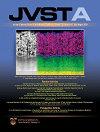利用断层光学发射光谱测量和碰撞辐射模型诊断氩电感耦合等离子体电子温度和密度的空间分布情况
IF 2.1
3区 材料科学
Q3 MATERIALS SCIENCE, COATINGS & FILMS
引用次数: 0
摘要
根据碰撞辐射模型分析断层扫描光学发射光谱测量得出的等离子体光谱发射系数的空间分布,以诊断Te的电子温度和Ne的密度的空间分布,这种方法鲜有报道。这项研究旨在对过程等离子体进行现场诊断。在氩电感耦合等离子体中同时测量了 18 条视线的光谱辐射率。通过光谱层析计算获得的光谱发射系数的空间分布,计算出激发级数密度分布的空间分布。根据获得的激发水平数密度空间分布,利用碰撞辐射模型分析了 Te 和 Ne 的三维分布。讨论了功率和压力对 Te 和 Ne 空间分布依赖性的影响。此外,还讨论了粗波长分辨率光谱断层测量的数据处理方法。本文章由计算机程序翻译,如有差异,请以英文原文为准。
Spatial distribution diagnosis of electron temperature and density of argon inductively coupled plasma by tomographic optical emission spectroscopic measurement and collisional-radiative model
There are few reported cases in which the spatial distribution of spectral emission coefficients of plasmas from tomographic optical emission spectroscopy measurements is analyzed based on a collisional-radiative model to diagnose the spatial distribution electron temperature of Te and density Ne. This study aimed at in situ diagnosis of process plasma. The spectral radiance of 18 lines-of-sight was measured simultaneously in argon inductively coupled plasma. The spatial distribution of the excited level number density distribution was calculated from the spatial distribution of spectral emission coefficients obtained from spectral tomography calculations. The three-dimensional distribution of Te and Ne was analyzed using a collisional-radiative model from the obtained spatial distribution of the excited levels number density. The effects of power and pressure on the dependence of the spatial distribution of Te and Ne were discussed. Furthermore, data processing methods for spectral tomographic measurements with coarse wavelength resolution were also discussed.
求助全文
通过发布文献求助,成功后即可免费获取论文全文。
去求助
来源期刊

Journal of Vacuum Science & Technology A
工程技术-材料科学:膜
CiteScore
5.10
自引率
10.30%
发文量
247
审稿时长
2.1 months
期刊介绍:
Journal of Vacuum Science & Technology A publishes reports of original research, letters, and review articles that focus on fundamental scientific understanding of interfaces, surfaces, plasmas and thin films and on using this understanding to advance the state-of-the-art in various technological applications.
 求助内容:
求助内容: 应助结果提醒方式:
应助结果提醒方式:


